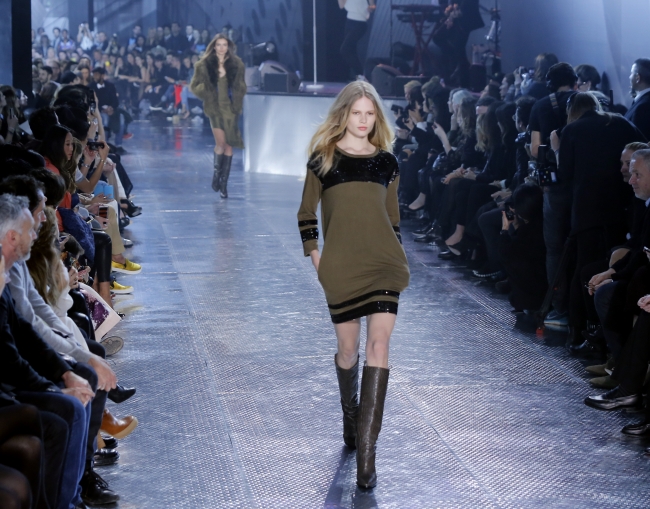PARIS (AP) ― The first full day of Paris’ frenzied ready-to-wear shows mixed up iconic fashion veterans like Dries Van Noten with a whole new sort of fashion player: H&M.
It may be a tricky ride ahead for the main street shop, which is now attempting to walk the snooty high fashion runway.
Yet the company, which has still not been allowed on the official Fashion Week calendar, put on a buzzy show-spectacle replete with strobe lights, plasma screens and Jessica Alba which may go some way in shutting up the detractors ― at least until next season.
Here are the highlights of the day.
Jessica Alba earns millions but shops for $20
Alba may earn millions every time she does a movie, but it doesn’t stop her counting her pennies.
The Sin City actress turned up at Wednesday’s show in a white H&M lace dress with black tights, hugging model Miranda Kerr for the cameras.
“Yes, I’m wearing H&M. It feels very romantic, sort of gothic. Red lips and black tights throw off the romantic lacing. Mixing high and low that’s how I dress,” Alba told the Associated Press.
“I love shopping at H&M and I can always find great pieces, if I need a great blazer or a pencil skirt,” said the multimillionaire, momentarily forgetting she can afford a stylist.
H&M’s creative advisor speaks on fashion socialism
 |
Models present creations as part of H&M’s ready-to-wear fall-winter 2014-2015 fashion collection presented in Paris on Wednesday. (AP-Yonhap) |
She’s been one of the most influential figures in fashion, but H&M head designer for over 20 years Margareta van den Bosch still wasn’t allowed to finish her champagne ahead of the H&M show that channeled the knee high boots, center partings and khaki shades of the ’70s.
Bosch, who happened to sit next to an Associated Press writer during the high-octane presentation, was H&M chief designer for over 20 years and pivotal in the company’s high-profile collaborations with Karl Lagerfeld, Roberto Cavalli, Stella McCartney and Versace.
But Bosch remains down-to-earth, and doesn’t forget her roots.
This, despite the endless paparazzi flashbulbs that snap before her.
“I like fashion. I was a designer myself for 22 years when I started in ‘87 as head of design, and the vision was that we would make nice clothes at good value for money ― something for all people. Fashion for everybody,” she told The Associated Press.
But how does she answer the high fashion snoots that say lesser quality clothes have no place on Paris’ esteemed runways?
“I really admire people that do things by hand and fantastic hand craft ― but I think we can all exist. There must be a place for us all. Not everybody can pay for that haute couture, and they also deserve some fashion,” she said.
Dries Van Noten is bold as brass
Dries Van Noten infused what he called a “glimmer of Glam” with the optical lines of famed British artist Bridget Riley.
The result was a collection that was much bolder than usual, but with some beautiful statements. Glam-rock-style silver wave patterns made the silhouette near-invisible and while black stripes against strips of printed flowers that played optically with two and three-dimensions. Strips of floral prints sometimes looked like camouflage, the designer’s signature, inset like shards on a skirt below an oversize or daintily fitting top. Van Noten, again, shows he is Paris Fashion Week’s master of illusion.
At times, however, some of the thick swirling patterns ended up looking simply a bit too brash and might stop traffic for the wrong reasons.
This was the case, for instance, on one otherwise cool anachronistic Regency jacket in with contemporary black-beige lines, and, elsewhere, in wide swirls of contrasting vermillion and navy.
The best of the optical musing was when the geometry got complex and diffused the boldness.
Arty-farty
Damir Doma gave classical tailoring a frayed, grungy edge with a splash of art.
The Croatian-born designer was inspired by contemporary artist Gerhard Richter with a collection of mottled ochre jacquards.
And some beautiful back column dresses sported the German painter’s famed stripes.
But the most on-trend part of the strong show were the turtle necks above horizontal, truncated shoulders. Watch this space ― we may see more of this to come this week.
Guy Laroche’s designer Marcel Morongiu also went arty-farty, but with less success.
He channeled the palette of Russian-born French artist Serge Poliakoff for a chocolate brown and muted anthracite color wheel.
Then, elsewhere, the collection borrowed from French painter Pierre Soulage’s black on black in the shimmering collection composed mainly of shirts and dresses.
But some designers should just forget the high-art references and let the clothes talk.
This show was really about bold sexuality.
Frills on dresses came in oversized curvaceous volumes ― stabbing out like a shield next to shiny, kinky leather jackets that were a tad obvious at points.
While sheer silk tops with embroideries, described as “trompe l’oeil,” were plainly just made to titillate.
Rochas debutant makes demicouture
Change is underfoot at Rochas, the old French house that is famed to have been first to put pockets on skirts.
Alessandro Dell’Acqua showed his debut collection, following predecessor Marco Zanini’s departure for Schiaparelli ― and the new man certainly paid homage to Rochas’ couture style.
The huge volume that’s made the house such a hit in recent years was present on off-kilter trapeze silhouettes, often on fastidiously embroidered gowns.
But there was more than a dash of eccentricity: Full skirts with unusually loose waists swaggered down the catwalk, while some even sported second A-line skirt underneath with buttoned up princess coats adding a prudish modesty.
It was a strange collection ― known as “demicouture:” not quite ready-to-wear, not quite couture. But somehow it worked.








